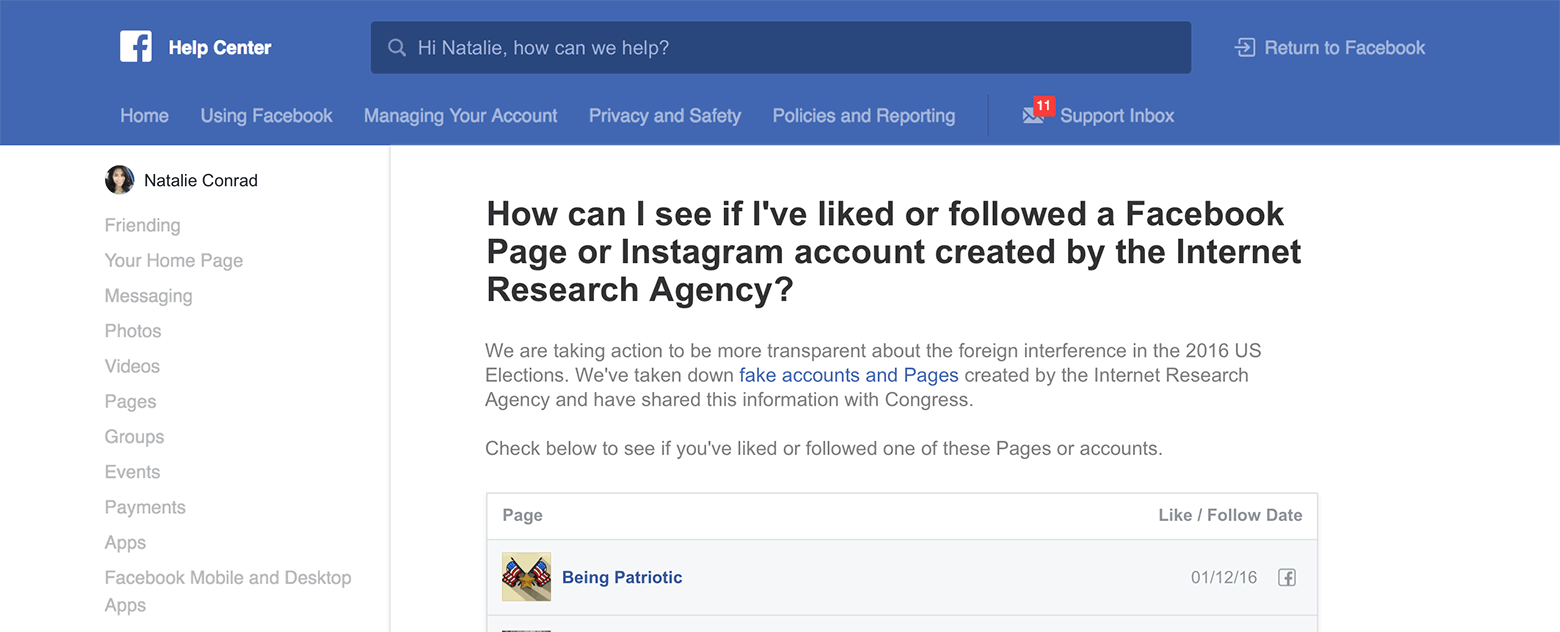Facebook helps Americans who are hit by trolls

A month ago, Facebook promised to develop tools against fake accounts and news generated by the “troll factory”, the so-called Internet Research Agency.
Now the social network has kept a promise - and released the appropriate tool available to affected users in the Help Center. With it, you can see which pages or accounts of the “fake generator” user randomly liked or became a follower on Facebook and Instagram. It is assumed that having learned about the fake nature of these accounts, a person can correct his mistake - and unsubscribe. At the very least, he will know that he has been deceived.
Unfortunately, this information tool reports only likes and subscriptions. That is, it helps only a small fraction of those 126 million people who saw the fake posts of the Internet Research Agency on Facebook and Instagram during the American election campaign in 2016 (according to Facebook ). A user could see these messages in his feed if someone from his friends liked them.
')
The investigation showed that from January 2015 to August 2017, trolls generated about 80,000 pieces of “organic” content (that is, written by people) on Facebook. About 29 million Americans saw these messages in their tape, and through reposts and likes they spread to an audience of 126 million Americans.
The Facebook tool also does not allow you to check whether a specific user of any of the 3,000 advertisements that the Internet Research Agency bought on a social network were shown during the election campaign. According to Facebook, they spread to an audience of about 10 million people. Unknown agents in the interests of some individuals spent on advertising more than $ 100,000 .
Facebook recognizes that it is too “difficult” to identify and notify every user who has undergone this kind of propaganda, that is, has seen content generated or paid for by agents.
Facebook’s actions can be called forced because the social network has been heavily criticized along with Google and Twitter for failing to resist the disinformation of the Internet Research Agency during the hearings before the Senate Law Committee in October 2017. Facebook, especially, became the main channel of foreign propaganda, which reached 126 million US users. In turn, Google found on YouTube 18 channels related to this kind of misinformation and search advertising for a modest amount of $ 4,700 .
Twitter identified 2,700 troll factory accounts. She also compiled a report on bots and disinformation , explaining how to automate actions on these accounts. The company has shared inside information with Congress investigators who are now conducting the case.

Printouts of accounts created by trolls of the Internet Research Agency on Facebook are demonstrated at the hearings of the intelligence committee of the House of Representatives. Photo: Shawn Thew / EPA
At the same time at the hearings, the senators appealed to these three companies to notify users who could see this propaganda. Facebook has now tried to fulfill the demands of politicians. It can be assumed that Google and Twitter, too, must somehow respond and try to partly make amends. But Google had earlier in the letter notified the Democratic senator Richard Blumenthal that it could not notify all YouTube users who watched videos from questionable sources, since "the content is available for viewing regardless of whether the user has logged into his account or not." According to Google’s explanation, this means that “it’s impossible to identify everyone who has watched a particular video”.
Facebook, Google and Twitter promised the congressmen to more carefully consider political advertisements so that such a story would not happen again. Google promised to launch a special political advertising database and introduce verification that all buyers of such ads are US residents.
Internet Research Agency is a Russian company headquartered in St. Petersburg. According to media reports , it is engaged in influencing public opinion in the interests of the Russian government. Employees of the company are engaged in the distribution of posts and comments in social networks and the media in order to form a certain public opinion. The company has been operating for several years.
Much of the content generated by paid “trolls” on Facebook and Instagram is aimed at inciting social and political unrest around controversial topics such as the rights of sexual minorities (LGBT), racial and religious issues.
Note: When commenting on this material, please follow the rules of Geektimes . Please refrain from insults and toxic behavior. Postmoderation works in the comments.
Source: https://habr.com/ru/post/374125/
All Articles